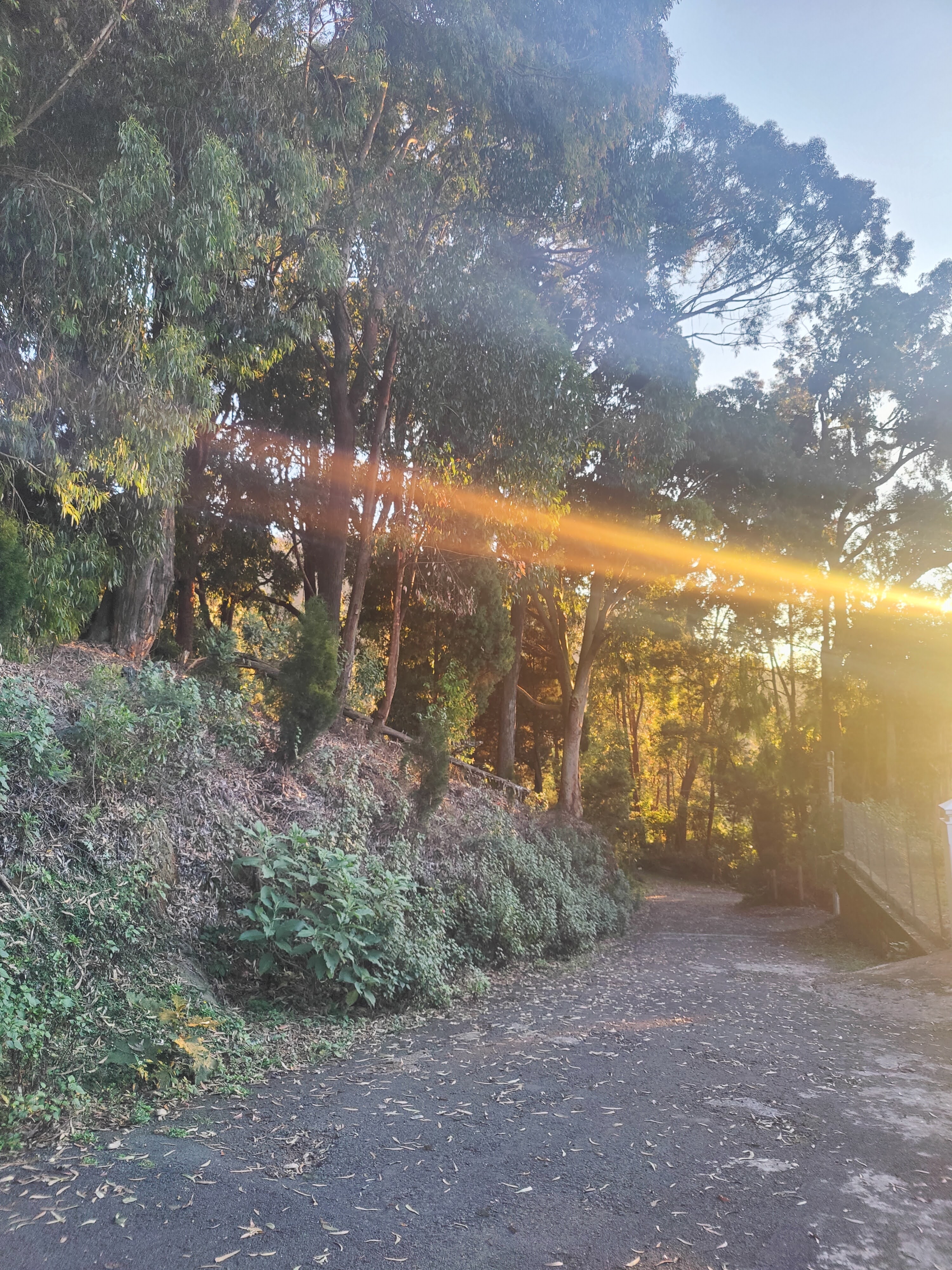WORDS AND PHOTOGRAPHY BYKrittika Sharma
Listen to this story. Narrated by Krittika Sharma.

Someone recently asked me how I might describe the last few years of my life. My mind searched for the right words, but only this constant phrase emerged: “I’ve been in a long season of loss.”
While I nurture and hold space for others humanizing loss as a grief educator, I found myself struggling to deal with my own grief as it quietly seeped into my being. It was omnipresent and relentless. There was no respite from it. Not in the sunroom, not in my favourite reading chair, not even in the carefully chosen keepsakes that once brought joy. Even comforting rituals like buying the weekly flowers or lighting the fireplace felt like chores.
My grief came in many forms. Sometimes, it was steady and expected, like a clock striking the hour. Other times, it felt like carrying invisible weights that threatened to pull me under. And then there were moments when it arrived without warning: a scent, a song, a texture brushing against memory, and suddenly I was elsewhere, undone.
Grief doesn’t always come with a dramatic impact. Sometimes, it alters your sleep patterns, the way you hold your shoulders, and the taste of food in your mouth. It quietly yet deeply settles into your body, until even your silhouette starts to resemble the weight of loss.
Grief doesn’t always come with a dramatic impact. Sometimes, it alters your sleep patterns, the way you hold your shoulders, and the taste of food in your mouth. It quietly yet deeply settles into your body, until even your silhouette starts to resemble the weight of loss.
From the outside, nothing about me appeared different until strangers began commenting on how fit and lean I looked, assuming I was on a strict health regimen.
I wanted to tell them that my body wasn’t becoming stronger; it was simply learning how to carry sorrow. Grief had become an unseen sculptor, reshaping me in ways I hadn’t consented to. That’s when I realized that my body and spirit were simultaneously holding what was and what could have been, and it was starting to tell. That inner split –– between what was visible and what was felt led me to a deeper inquiry.

Through my lived experience and years of research at Maajhi, I have learned that the antidote to grief is not hope, but rather forms of expression that reaffirm the journey through loss. During these times, I sought out creative pursuits and sources of meaning that provided me with stability. I turned to yoga and writing, and when my abilities were limited, I found comfort in the work of other artists whose experiences resonated with me. I spent an entire day at the theatre, immersing myself in Maria Callas' journey, exploring the lives of the women depicted in "All We Imagine as Light," and revisiting the poignant narratives presented in "Past Lives."
At first, these acts felt like trying to sing underwater. However, over time, they helped me reconnect with my sense of self-belonging again. They reminded me of life’s elemental paradox—there is sorrow in beauty and beauty in sorrow.
I often think of the world’s loneliest whale, named Whale 52, whose vocalization at a frequency of 52 hertz was never heard by any other of its kind. It is a kind of grief, is it not, sending notes into the deep blue oblivion, waiting for a response that may never arrive? The calls of Whale 52 were first heard in 1989 and have continued to be heard in the years that followed. The whale remained hidden, but its song endured. Its song is the only proof of its presence and a reminder of the absence it endures.
What would it look like for us to learn to inhabit the silence of grief and compose our own song?
We stand at the edge of the ocean, feeling its pull, aware that we could be swallowed and still want to wade deeper. The silence of grief is no different. It is not something to conquer. It is an invitation for a sacred surrender.
This kind of quiet holds the spaciousness of becoming.


We often treat silence as absence, as passivity. But in truth, it holds space like nothing else. It carries the echoes of others: not from duty, but from memory, from love, from the sifted remnants of what remains. It is the organic doorway to connection and kinship —a quiet sunset, the rustle of eucalyptus trees, or the gentle breathing of a beloved pet beside you. It is in these sacred moments that we learn to listen, and it is here that we learn to sing again.
The world urges us to rush through grief. To “move on.” To “be strong” and take a sharp turn towards being “normal” again. To send emails. To attend birthdays. To move forward.
Grief isn’t linear. It shows up unannounced, in scents, in songs, in objects we didn’t expect. I certainly wasn’t removed from these universal feelings. It demands stillness. Its silent roots are a part of our being. It isn’t a guest we can usher out.
But eventually, this suspension begins to change us. At first, it’s suffocating. A weight on the chest. An ache in the throat and breath. The quiet we never asked for, but it asks us to surrender. It doesn’t offer a timeline. It demands that we move, think, and speak differently while coexisting in two worlds at once. Silence finds the beautiful ruin within us. It allows us to breathe.
Philosopher and poet David Whyte says,
“Silence is frightening, an intimation of the end, the graveyard of fixed identities. Real silence puts any present understanding to shame; orphans us from certainty; leads us beyond the well-known and accepted reality and confronts us with the unknown and previously unacceptable conversation about to break in upon our lives.”
Those words speak to an uncomfortable void I have encountered—one that dissolves certainty and calls for embodiment. Sometimes, I wonder if silence is the original language of the body– what the breath, pulse, and marrow have always spoken in. In this state, we cease to translate our experiences into a form that is understandable to others. Instead, we begin to inhabit it. Not perform it, not escape it, but simply be with what is- wordless, but deeply understood. And so, I return to it. Not to escape, but to listen, and rearrange oneself.
This is why I turn to nature. Nature is our oldest teacher. It does not shy away from loss: it honours it. The falling yellow leaves from a contrasting birch tree, the white death of winter, the quiet unfolding of spring, like how the cherry blossoms burst into their rioting blooms down my street. These are not metaphors. They are truths. Nature moves with certainty, unhurried, accepting the cycle of loss and renewal.

And in my home? The quotidian and the sublime infuse silence — the whistle of the kettle, the crackle of cumin in hot oil, the sound of water falling in vessels touching different vessels, the memory of the warmth of a hand that once held yours.
This wisdom of seeing and feeling has found its place in both my personal and professional life.
My work often places me in the stillness of these paused moments.
Like sitting with a cancer patient nearing death while their medical team avoids the subject. Holding space for a mother who’s had multiple miscarriages and still feels like a mother, even though the world refuses to define her that way. Being with an entrepreneur who believes they’ve failed at life and needs to be witnessed, not fixed. Walking beside a family member wanting to start a conversation, unsure of how. And watching those working in the space of death and dying—weary and quiet—find momentary rest in a corridor of acknowledgement. In those moments, silence is not the absence of communication; it is a profound form of expression. It is the fullness of connection when words fail.
Like sitting with a cancer patient nearing death while their medical team avoids the subject. Holding space for a mother who’s had multiple miscarriages and still feels like a mother, even though the world refuses to define her that way. Being with an entrepreneur who believes they’ve failed at life and needs to be witnessed, not fixed. Walking beside a family member wanting to start a conversation, unsure of how. And watching those working in the space of death and dying—weary and quiet—find momentary rest in a corridor of acknowledgement. In those moments, silence is not the absence of communication; it is a profound form of expression. It is the fullness of connection when words fail.
My father once told me, “Be comfortable with silence. It offers company like nothing else.” At the time, I didn’t fully understand what he meant. But now I know: quietude isn’t passivity. It’s the hum beneath everything. A quiet yes to being, without performance, without pretence.
For me, it became a space where I stopped saying yes just to make others comfortable. I allowed myself to say maybe or no, because my authenticity mattered more to me than anyone else's approval. This required a different kind of courage—one that was driven by compassion. I needed to be self-sufficient so that I could support others.
For me, it became a space where I stopped saying yes just to make others comfortable. I allowed myself to say maybe or no, because my authenticity mattered more to me than anyone else's approval. This required a different kind of courage—one that was driven by compassion. I needed to be self-sufficient so that I could support others.

The pulse of life that continues even when everything else falls away. It’s in a hospital room. Between meetings. In a long gaze. In the sigh of a child falling asleep. It invites presence. It allows us to listen to grief, to life, and to ourselves.
Where did you last find yourself in silence? Was it welcomed? Did you seek it out, or did it find you? Or did it arrive uninvited on a city street, a hospital corridor, or a flight between destinations? If we listen closely, we might discover that the mutedness is not an absence, but a cloak of presence, an eternal companion that holds space between what was, what is, and what may be.
One of the questions I often ask while taking people through an experiential meditative journey of dying is: What matters most to you in this life? This practice invites us to envision our own death—not as a dark place, but as a quiet threshold where truth becomes clear. In that space, distractions fall away, and what matters most begins to speak. To discover our sense of aliveness in the face of death, we must remember that even endings are intertwined with the beginnings of something authentic. I believe the answer lies not in the clamour of certainty but in the sacred language of grief. It involves the willingness to sit with what is unfinished and the courage to invite silence—not to find solutions, but to offer companionship.
If anyone asks me where I am today, I tell them I am learning to sing where no echo returns, and to stand with the quiet dignity of all things broken and still beautiful, shaped by the long conversation between grief and grace.


